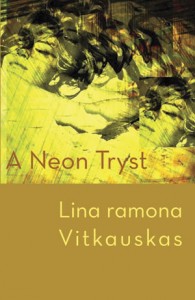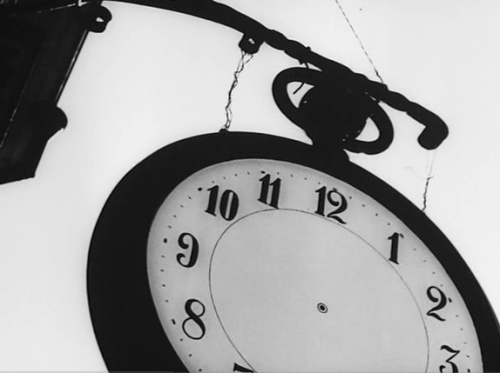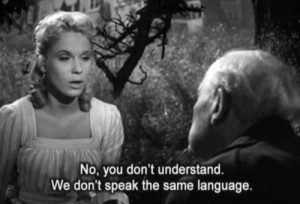 A Neon Tryst
A Neon Tryst
By Lina ramona Vitkauskas
Shearsman Books, 2013
84 pages / $15 Buy from Amazon or SPD
Lina ramona Vitkauskas’s ekphrastic book of poetry, A Neon Tryst, has just been released by UK publisher, Shearsman Books. It begins:
Contents
Black Patent Translations
to L’Eclisse 7
Wilson, 722
to Seconds 29
Into the Black Flocks
to Wild Strawberries 59
These parts each begin with a short summary of their respective film:
L’Eclisse (1962) stars the sleek-silver-hypnotic Monica Vitti as a lost woman re-discovering herself after leaving her husband…
Seconds (1966) stars Rock Hudson as an aging, bored, East-coast man who is encouraged to commit pseudocide by an ominous group of wealthy men called ‘The Company’…
Bergman’s classic film, Wild Strawberries (1957), tells the tale of an aged, retired professor travelling cross-country to his alma mater to receive a lifetime achievement award.
I liked being reminded of Antonioni’s L’Eclisse, in particular, geometric Monica Vitti dripping across the screen, her crystalline angles and lines, filmed in black-and-white.
Printed on the back cover of A Neon Tryst is this:
all the main characters share an internal conflict—losing identity with the passage of time.
The book’s cover art is a still from the film, of Vitti’s sleeping face, doubled and cropped. Vitkauskas manipulated the image herself. She has made it wilder: she has given it color:
 This is a Neon Tryst. The monochrome Monica Vitti has been given layers. Her sleeping eyes lit from below, impressed from above, the Vitti on the cover sends a different signal than the Vitti of the film. We are reminded whose tryst this is—Vitkauskas’s: electric, in neon.
This is a Neon Tryst. The monochrome Monica Vitti has been given layers. Her sleeping eyes lit from below, impressed from above, the Vitti on the cover sends a different signal than the Vitti of the film. We are reminded whose tryst this is—Vitkauskas’s: electric, in neon.
L’Eclisse, Seconds, and The Wild Strawberries were all made during the late 50s and early- to mid-60s, in black-and-white.
I located Wild Strawberries, invoked in Vitkauskas’s third and last poem, first, and decided to watch it for the first time in probably ten years.
The film is obsessed with the futility of time, in its classic images of hand-less clocks, the perpetual intrusion of dream sequences upon the story.

No matter which of Bergman’s films I watch, there is a quality they all seem to share, which never seems to waver: anything in life of any value resides in recollections of one’s childhood. Though Bergman was only 39 when he made Wild Strawberries, he seems to predict his own fate in the character of Isak Borg, the aged professor of his film. Bergman says in an interview late in his life, “I would have been happier if I’d been anonymous.”
Vitkauskas devotes 22 poems to the film. In German, the word for poetry means to condense. So I marveled at what Vitkauskas does with, say, this sequence, Professor Isak Borg’s strange, “humiliating” dream:
 Vitkauskas writes “Dozing off”:
Vitkauskas writes “Dozing off”:
Unlanguage our blessings.
Listen as a professor.
You know so much and know nothing.
Her striped dress
as she runs through sheets,
rotten baby in a curdled bassinet,
her curls succeeding
your twisted branch.
Here the life breathes into the black flocks.
As this section of the book is called “Into the Black Flocks,” I wonder if this might be the most important image in the film for Vitkauskas. Certainly she knows something about breathing neon into black-and-white.
Invoking these films in her language, on her page, new sequences unfurl, almost as though new characters are speaking. The people on Vitkauskas’s pages have been conjured from the world of Bergman, but in that transmutation enjoy a new kind of existence.
For instance, when Isak Borg dreams of a real scene he was made to witness many years before, of his wife’s infidelity, there is the poem, “The swamp moss, the rusted ladder”:
Resistance is a board,
Laugh a pop of ice
among tenderized digits,
each number a calculated
sweet, an emerald lisp of jealousy.
Vitkauskas has given Isak Bork a new voice: a grubbier, bolder one, more saucy and motoring. In other poems, he cracks jokes, he assaults. Vitkauskas receives a late-night hum, works like an interloper, transmuting the film world into her pristine hint of wink and back row auditorium smack. There is something in these poems that at times feels smarter than the films they invoke. And that’s a good thing.
In this scene from John Frankenheimer’s Seconds, the character of Rock Hudson, framed by the ominous “Company”, has been transformed from bored businessman retiree to hip, young emerging artist via reconstructive surgery. A beautiful young woman he discovers on the beach (who he will later discover has been hired to dupe him in his new life) is instantly smitten with him.
“Nora Marcus”
Her bare feet in ocean,
all the power.
Mind her
and chop her
with two boys,
complete with microwave oven.
Kitchen floor
face
rain.
Finishing
the hurt.
She is so sweater,
she is so weather,
she knows I null myself
impure, that I am tentative.
Unturned.
Her teeth just like everyone’s.
It is very nice here.
The good things always happen with the rain.
At this moment, when the words of the film and the words of the poem are the same, Vitkauskas calibrates to the film’s original timbre, but on her own terms. In writing from the perspective of the “impure…tentative/Unturned” leading man, we feel very thick in a tryst, ether-ridden, a new moon quaking above.
Here, too:
“Convertible Dionysius”
What do you do with a drunken sailor?
Where’s the wild-wine-nipple Renaissance?
Here.
She fucks everyone’s accordions, flutes, and laurels.
Rock Hudson, I break you into coronets.
She in grapeseed residue pressed against fertile bodies,
braless bosoms, rosy-buttocked as Anne Boleyn.
She slips off her white dress
and rubs me in Santa Barbara:
a new model of a barrel life, laughing.
I don’t know any of these people.
I’m dying and that’s the world.
In taking on the transformed movie man’s voice, Vitkauskas cuts to the core of his yearning, while making him wilder, more clandestine. In the poems, I appreciate him more than I do in the film because, through Vitkauskas, I understand him differently, perhaps better.
My favorite poem in the book might be in the L’Eclisse section.
“The dogs of the neighbourhood”
Love is difficult;
drunk as an upright poodle.
The tone is Vitkauskas’s own: she has a rye glint in her eye, too wise to come on cantankerous. Hers is a resigned world-wear, the kind that is so much fun. “Wicker Clouds” begins:
Carmel Coral is too vulnerable
for a ring, for a new car, for a husband!
Then the poem spills into actual film dialogue, in italics. Vitkauskas appears again, at the end, for a real one-line cincher:
We sex for the keyhole game.
So the poet surrounds the film with her voice, playing it like book-ends.
I like how Vitkausas zooms in on one small item from a scene, making it the title of a poem, heralding the life of objects. Like in “Dino’s mini fan,” which “clashes with trading/screams at the ugly bell” of the stock exchange, in the “octopi pit/into the lamb dance of worth.”
In Vitkaukas’s biography on Shearsman Books’ website, there is a note that the poet is “fascinated by…retinas (after nearly going blind)”. This did not surprise me. Vitkauskas’s lens is kaleidoscopic, atemporal, hypnotic—and makes me wish “ekphrasize” were a verb.
***
August Evans thinks long and hard about that wild sound.
http://augustevans.blogspot.
Tags: A Neon Tryst, August Evans, Lina Ramona Vitkauskas

yes; this is a very good book: I’ve been reading it for weeks now, and it holds up—
hopefully she’ll do another like this, or several— it seems such an innovative way of fusing poetry and film . . .
[…] Check out August Evans’ review of my book A Neon Tryst […]
agreed–i would love to see another series as well–